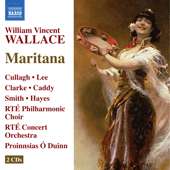|
Back
12/21/2011
William Vincent Wallace: Maritana
Majella Cullagh (Maritana), Paul Charles Clarke (Don Cæsar de Bazan), Ian Caddy (Don José de Santarém), Lynda Lee (Lazarillo), Quentin Hayes (Charles II, King of Spain), Damien Smith (Captain of the Guard/Alcade), RTE Philharmonic Choir and Concert Orchestra, Proínnsais O Duinn (Conductor)
Recording: O’Reilly Hall, University College Dublin, Ireland (September 19-20, 1995) – 109’14
Naxos # 8.660308-09 – Booklet in English

   
A fountain of operatic works created in the mid-19th century within mainland Europe overwhelmed those germinated from the island of Great Britain and its historically rebellious neighbor, Ireland. Nevertheless, within these geographic boundaries lay a munificent collection of operatic works which should be recognized at the very least for their unique addition to this musical genre.
The extraordinary life and travels of William Vincent Wallace only adds to the flavor and influences found within his own compositional résumé. Enter Maritana, penned by the Irishman which debuted at London’s Drury Lane Theatre in 1845.
Contemporary influences surrounding Maritana are plentiful. Though characteristically Irish in heft, one will sense sporadic stints of Auber (in the “Ouverture”), Meyerbeer and an umbrella of Neopolitan cognizance emphasizing Rossini, Bellini and to a lesser extent, a tuft of Donizetti. Yet despite these widespread pervasions, there’s something inherently Gaelic in the melodic dialogue.
Settings highlighted by co-librettists Edward Fitzball and Alfred Bunn are apropos to the Spanish locales based on the 1844 play Don César de Bazan by Adolphe-Philippe d’Ennery and Philippe François Pinel Dumanoir. But Wallace weakly parlays the Iberian pastiche into only one selection (Act II, Scene II’s chorus, “Oh! What pleasure the soft guitar”) utilizing abbreviated castanets (in comparison to Jules Massenet’s now lost opéra-comique Don César de Bazan from 1872.)
Though the plot is hysterically absurd, Wallace colorfully weaves arias, duets, quartets and ballads into the score which has an amorphously tuneful operetta flair running counter to the more serious-minded libretto. Of particular note is Act I’s Maritana/Don José duet featuring a beautiful harp accompaniment, Clarke’s trenchant “Yes! Let me like a Soldier Fall” and the harmonious “Prayer Duet” featuring Cullagh alongside velvety-voiced Lynda Lee in the trouser-role of Lazarillo.
The lyrical qualities of Majella Cullagh are acutely splendid overall, reminiscent of Anneliese Rothenberger’s vocal acumen found in Friedrich von Flotow’s Martha (ref: “Letze Rose”), but, unfortunately, Ms. Cullagh’s rendition of the hallmark ballad, “Scenes that are brightest” is a tad lackluster and retains dissipative flatness. Ian Caddy is a fitting Don José with his richly coated baritone register while Quentin Hayes brings a foundation of magisterial qualities as King Charles II of Spain.
Generally speaking the sound quality is good, but the recording has subtle moments of volumetric inconsistencies, particularly in the middle of Don Cæsar’s most memorable aria, “There is a flow’r that bloometh.” John Allen’s forward is fascinating and enlightening. Those who wish to follow along with a complete libretto are able to do so by accessing the Naxos website.
Those who want to better acquaint themselves with English operas from the Romantic period would enjoy visiting this best known work by William Vincent Wallace.
Christie Grimstad
|